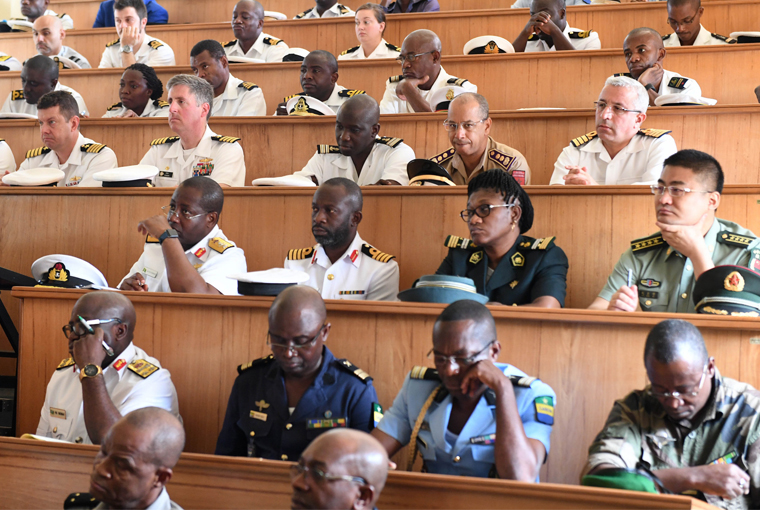Naval War College participates in Obangame Express 2018 Senior Leadership Symposium

LIBREVILLE, Gabon – Senior leaders from Gulf of Guinea nations, Europe and North and South America participated in a three-day U.S. Africa Command sponsored senior leaders’ symposium (SLS) during Obangame Express 2018, March 26-28.
The symposium was co-hosted by the U.S. Naval Forces Africa and Armed Forces of Gabon.
“The SLS is a critical opportunity for leaders of the Gulf of Guinea region to get together and talk about the pressing challenges they all face in common,” said Thomas E. Mangold, Jr, U.S. Naval War College (NWC) dean of international programs. “It’s important that they meet them together because no country alone can secure the seas in the area.”
Maintaining and achieving security in the maritime environment requires support of all the nations in the region and around the globe.
“All the seas are interconnected and the threats come from anywhere,” said Mangold, a retired U.S. Navy captain with 30 years of service.
As part of Obangame Express, the symposium was designed to provide a forum for senior naval leaders to discuss common maritime challenges and opportunities to enhance international maritime security.
Guest presenters and panel discussions covered a wide range of topics including the importance of national and regional domain awareness, regional cooperation and maritime interoperability, and challenges associated with building and maintaining a competent and professional maritime intelligence workforce.
Although many of the presenters were professors at NWC, some were from nonprofit nongovernmental organizations such as One Earth Future (OEF).
OEF speaker Kelsey Soeth presented the “Stable Seas Maritime Security Index,” an in-depth effort to measure and map interconnected challenges to maritime security, such as illegal fishing, human trafficking, and illicit trade.
The index, developed by extensive research from multiple programs, highlight the importance of addressing threats to maritime security not as isolated issues, but as a network of interconnected activities.
“What this in-depth analysis can do is help countries developed their maritime strategy,” said Soeth. “That in turn can help them meet their national objectives and goals.”
Although presentations and panel discussions took up the bulk of the symposium, a key part of the symposium included a war-gaming tabletop practical exercise that served as a capstone project.
“Scenarios are important because it allows the participants to take a hands-on approach,” said Jeffery M. Landsman, NWC associate professor of wargaming and the Africa Regional Studies Group. “Many areas that we have discussed need to be worked on and furthered with the African partners when they get around the table and talk to each other.”
Landsman said that it’s a critical means of allowing them to coordinate and solve problems instead of taking a passive approach to the important symposium material.
During the wargaming session, participants were assigned to one of three teams that were required to work through a West African maritime scenario. This year’s scenario consisted of criminal groups taking illegal actions using sophisticated and asymmetric tactics to target shipping and petroleum facilities in the Gulf of Guinea.
Landsman said that there were two major things he wanted to them to take away: the idea that the wargaming concept is a viable tool for maritime planning, and the conviction that through practical application they can solve problems based on operations they are expected to conduct between the Economic Community of West African and Central African States.
The scenarios are purposely designed to be difficult and complex in order to get the tabletop exercise players out of their comfort zones and challenge their previous assumptions.
For some participants, like Namibian chief of naval operations Rear Adm. Alweendo P. Amungulu, the symposium and war-gaming scenario were beneficial.
“This has been the first time I’ve participated in this symposium and it was quite eye opening,” said Amungulu. “Especially the organization of the community of West African and Central African States.”
Amungulu also said that the presentation “Building Capacity within the Maritime Domain Awareness Construct” by Timothy Doorey, Naval Post Graduate School Center for Civil Military Relations lecturer and program manager, was very helpful.
“We’re in the process of establishing our own maritime domain awareness center so when I go back I’ll be better able to bring the stakeholders together and able to speak the same language,” said Amungulu.
Exercise Obangame Express, now in its eighth year, is one of three U.S. Naval Forces Europe-Africa-facilitated regional exercises. The exercise is part of a comprehensive strategy by U.S. Naval Forces Europe-Africa/U.S. 6th Fleet (CNE-CNA/C6F) and AFRICOM to provide collaborative opportunities amongst African forces and international partners that addresses maritime security concerns.
Obangame Express falls under the CNE-CNA/C6F- facilitated international collaborative maritime capacity-building program Africa Partnership Station (APS) as part of a phased approach to building capacity with our African partner nations. APS sponsors training events throughout the year in order to enhance maritime tactics and techniques such as boarding techniques, port security, and small boat maintenance.
The 31 nations that participated in Obangame Express include Angola, Belgium, Benin, Brazil, Cabo Verde, Cameroon, Canada, Cote d’Ivoire, Democratic Republic of Congo, Denmark, France, Gabon, Gambia, Germany, Ghana, Guinea, Guinea-Bissau, Liberia, Morocco, Namibia, Netherlands, Nigeria, Portugal, Republic of Congo, Sao Tome & Principe, Senegal, Sierra Leone, Spain, Togo, Turkey and the United States, as well as the Economic Community of West African States (ECOWAS) and the Economic Community of Central African States (ECCAS).
